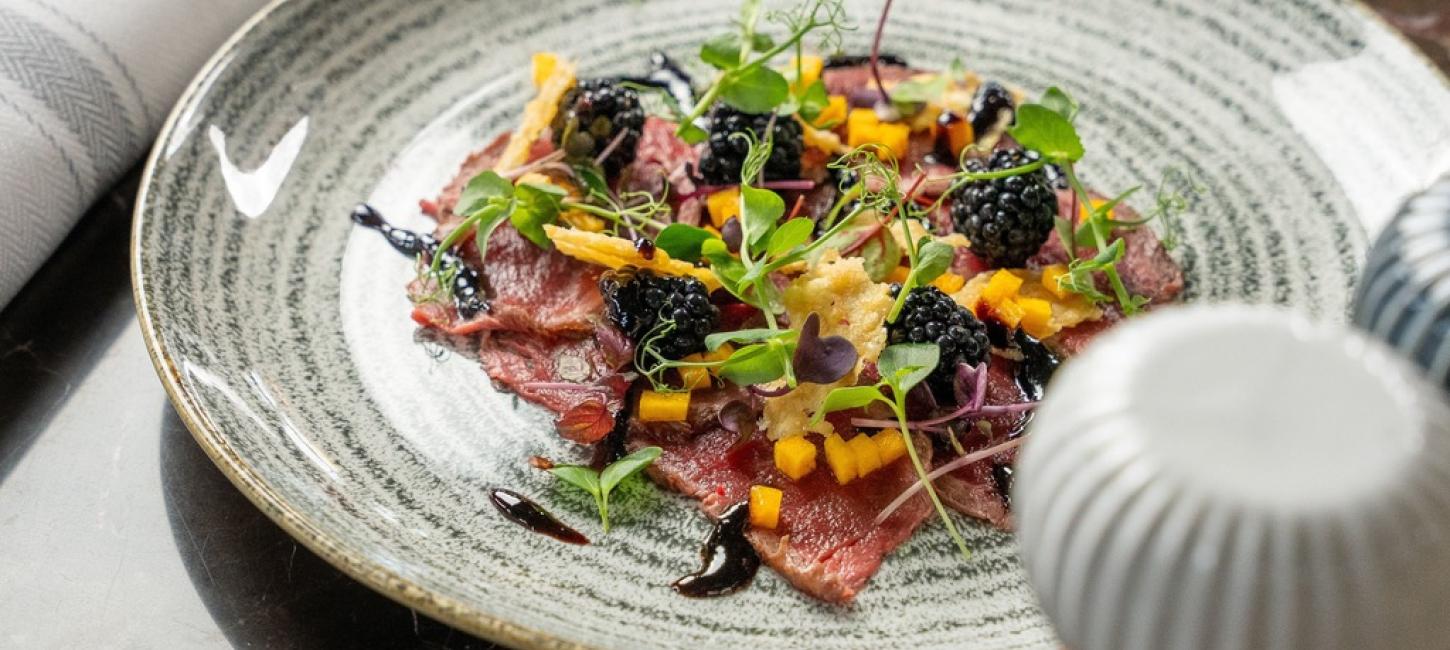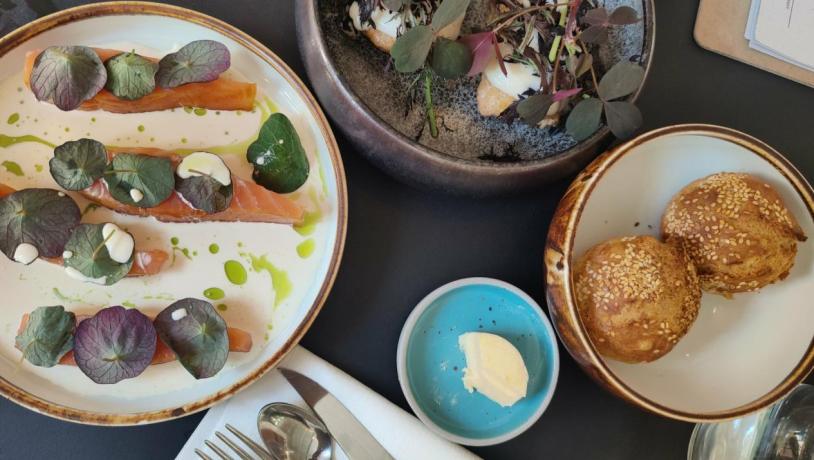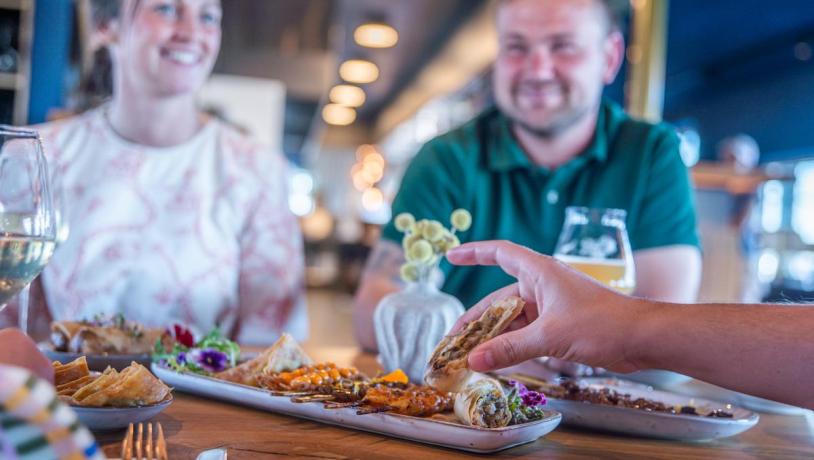Fjordgaarden Restaurant
Look forward to a dining experience with calm and time. The team at Fjordgaarden is passionate about the profession and endeavours to give you both bi...

Discover the best sustainable eateries in the North Sea. Enjoy locally produced, organic dishes that support the environment.
Welcome to a culinary journey along the North Sea, where sustainability and sublime gastronomy go hand in hand. In this destination, where the raw and unadulterated beauty of nature meets a wealth of local produce, sustainable gastronomy has found a fertile home.
Sustainable gastronomy in the North Sea is not just a matter of taste; it is a deep commitment to the environment and local culture. This article will take you on a journey of discovery through the gastronomic landscape of the North Sea, where every bite and every sip is a testament to the respect for nature and local producers.
The North Sea is a treasure trove of local ingredients, from freshly caught seafood to organic vegetables and fruits grown in the nutrient-rich soil. The eateries here embrace a 'farm to table' philosophy, where each meal tells a story about its place of origin and the people who grew and prepared it.
This approach to cooking is not just about creating delicious dishes, but also about empowering the local community, preserving the environment and promoting a sustainable future. So let's dive into how North Sea restaurants and eateries bring this vision to life and how you as a visitor can become part of this exciting and responsible food culture. Welcome to a responsible holiday by the North Sea.

Photo:Rasmus Krarup Jensen
The North Sea is home to a wealth of eateries that take sustainability seriously. From cosy cafés to gourmet restaurants, a focus on local and organic produce is a key element. Here is a selection of restaurants that stand out in their commitment to sustainable gastronomy.
Restaurant Fjordgaarden, Ringkøbing
Located in the heart of Ringkøbing, Restaurant Fjordgaarden offers an authentic taste of the North Sea. With a menu that changes according to seasonal produce, guests can enjoy dishes made with the freshest ingredients. Their commitment to sustainability is not only seen in their use of local produce, but also in their efforts to minimise food waste and use environmentally friendly packaging.
Hr. Skov, Blåvand
Hr. Skov in Blåvand is another excellent example of sustainability in practice. Known for its cosy atmosphere and creative use of local produce, this restaurant delivers a unique gastronomic experience. Mr Skov's menu highlights the best of the season, with a special emphasis on freshly caught seafood and homemade specialities.
Restaurant GRO, Varde
Restaurant GRO, located in the heart of the Arnbjerg Pavilion, offers a fusion of the purity of Nordic cuisine and the refinement of French cuisine, all served in the breathtaking surroundings of Arnbjerg Park. With an uncompromising commitment to local, sustainable and/or organic principles, GRO offers a culinary journey where quality is not just tasted - it is experienced.
Hotel Skjern, Skjern
At Restaurant Stuen th. the focus is on local, seasonal ingredients and everything is made from scratch. The menu always includes freshly caught North Sea fish and the parlour burger with beef from Økogårdene Skjern Enge.
These restaurants are also pioneers in green initiatives. From installing solar panels to recycling rainwater for watering vegetable gardens, they are leading the way in how restaurants can reduce their environmental impact. They also work closely with local suppliers to ensure their produce is grown in a sustainable and ethical way.
By visiting these restaurants, you are not only contributing to your own culinary enjoyment, but also supporting local agriculture and fishing. These eateries play a crucial role in keeping the local economy healthy and promoting sustainable practices throughout the destination. And the list goes on and on, so it's just a matter of exploring. Visit Restaurant Nordic, Dine & Wine, Høfde 4, Restaurant Sandgaarden and of course Henne Kirkeby Kro.
At the heart of the North Sea's sustainable gastronomy lies the local produce and ingredients that are grown and harvested in harmony with the destination's unique nature. These ingredients are not only the basis for delicious dishes, but also an expression of the area's cultural and geographical identity.
Fresh seafood
The North Sea is famous for its rich marine resources. The area offers a wide variety of freshly caught seafood that is caught in a sustainable way, ensuring the health and biodiversity of the sea. When you savour a plate of fresh oysters or freshly caught shrimp, you are tasting the essence of the sea.
Organic vegetables and fruits
The region's fertile soil provides perfect conditions for growing organic vegetables and fruits. Local farms and vegetable gardens produce everything from potatoes and root vegetables to berries and apples grown without the use of harmful chemicals. These ingredients not only contribute to flavourful dishes, but also support sustainable farming practices.
Meat from free range animals
Many restaurants in the North Sea prioritise meat from animals raised under humane conditions. This includes free-range cattle, pigs and poultry raised on local farms. This practice not only ensures higher quality and better flavour, but also respects animal welfare.
Local delicacies
Local delicacies are another important element of North Sea gastronomy. Local specialities such as honey, jams, cheeses and artisanal sausages reflect the region's gastronomic diversity and offer unique taste experiences that you won't find anywhere else.
Collaboration with local suppliers
The restaurants at Vesterhavet work closely with local suppliers to ensure freshness and quality. This collaboration is an important part of the sustainable food chain and ensures that each dish is not only a feast for the taste buds, but also a celebration of local farming and fishing.
"Sustainability from farm to fork" is not just a phrase in the North Sea, but a living practice that characterises the region's gastronomic scene. This approach is all about creating a direct connection between local producers and the restaurants that serve their products. Here we take a closer look at how this philosophy is put into practice, enriching both gastronomic quality and the environment.
Working directly with local producers
Many North Sea restaurants work closely with local farmers, fishermen and small-scale producers. This direct connection ensures that the ingredients are of the highest quality and freshness. It also allows chefs to be creative with the menus, adapting to the ingredients that are available throughout the seasons.
Freshness and seasonality
By using ingredients that are in season, North Sea restaurants can offer dishes that are both fresh and full of flavour. This also supports a sustainable farming model where crops are grown according to their natural growth cycle, which is better for the environment.
Supporting sustainable farming
This 'farm to fork' approach supports sustainable farming practices. Local farms that practice organic and environmentally friendly cultivation become preferred suppliers, helping to promote sustainability throughout the food chain.
Education and awareness
Restaurants also play an important role in educating guests about the importance of sustainable food. By explaining the origin of their ingredients and their choice of local suppliers, diners increase their awareness and appreciation of sustainable practices.
Local gastronomy
Finally, the restaurants by the North Sea act as a showcase for the destination's gastronomy. They offer unique dining experiences that reflect the richness and diversity of the local landscape and tell stories about the area they come from.
When it comes to sustainable drinks and wine, Vesterhavets restaurants and eateries follow the same high standards as with their food. They prioritise local, organic and sustainably produced beverages that complement their gastronomic offerings and support the local economy.
Organic and locally produced wines
Many North Sea restaurants have carefully curated wine lists that emphasise organic and locally produced wines. These wines are often made by producers who practice sustainable viticulture, which involves minimal use of chemicals and a respectful approach to the vineyards. By choosing these wines, guests not only support sustainable winemakers, but also enjoy wines of exceptional quality and character.
Sustainable breweries and distilleries
In addition to wine, the region also has a growing number of breweries and distilleries, such as Stauning Whisky, which produces organic and sustainable beers and spirits. These breweries focus on craftsmanship and quality, often using local ingredients like barley and hops. Their beers offer a diversity of flavours that reflect the unique terroir of the North Sea. In 2023, Stauning Whisky won the award as the world's most sustainable distillery at the World Whiskies Award.
Interaction with local ingredients
Both the wines and other beverages are carefully selected to complement the local dishes. This harmony between food and drink creates a more complete and satisfying dining experience, with each drink highlighting and enhancing the flavour of the food.
Commitment to sustainability
As with their food, the restaurants at Vesterhavet show their commitment to sustainability through their choice of drinks. By emphasising local and organic drinks, they contribute to a sustainable consumption culture and support small producers who work hard to maintain environmentally friendly practices.
Sustainability in gastronomy is more than a culinary trend; it's an essential approach to cooking that respects both the environment and our health. At Vesterhavet, this philosophy takes centre stage, with restaurants and eateries striving to reduce their environmental impact and promote the local economy through their food choices.
Environmental benefits
Sustainable cooking helps to reduce environmental impact. By prioritising local and organic ingredients, the need for long-distance transportation is reduced, which in turn reduces greenhouse gas emissions. Furthermore, using organic products helps protect the quality of the soil and supports a healthy ecosystem.
Support for local producers
When restaurants and eateries in the North Sea buy their produce locally, they support local agriculture and fishing. This helps preserve local jobs and strengthens the community. By choosing these places as a guest, you become part of this positive cycle that strengthens the local economic system.
Seasonal dishes
Sustainable gastronomy also embraces the principle of seasonality. Preparing food based on what's in season ensures freshness and the highest quality of ingredients. This not only leads to more flavoursome dishes, but also supports a natural growing cycle.
Health benefit
There is also a health benefit to sustainable food. Fresh, unprocessed and chemical-free ingredients mean cleaner and more nutritious meals. This not only supports your personal health, but also the wellbeing of the planet.
A taste of local culture
Eating sustainably by the North Sea is also a way to experience the culture of the region. Each dish tells a story about its place of origin, the traditions that have shaped it and the people who created it. It's a culinary journey through the heart and soul of the destination.

Photo:Visit Vesterhavet
As a visitor to the North Sea, you have a unique opportunity to support sustainable gastronomy and contribute to the continued environmental and economic health of the region. Here are some ways you can get involved and make a difference.
Choose sustainable eateries
One of the most direct steps you can take is to choose restaurants and cafés that prioritise sustainability. By eating at these places, you're supporting businesses that contribute to the local economy and environment. These eateries typically highlight their sustainable practices, so look for information about their sourcing of ingredients and environmental policies.
Try local specialities
Encourage people to try local dishes and specialities. This is not only a chance to experience the region's unique gastronomy, but also a way to support local producers and agriculture. Local specialities often reflect the region's cultural heritage and are an integral part of sustainable tourism.
Ask questions and learn
Be curious and ask questions about where the food comes from and how it was produced. Many North Sea restaurants are happy to share stories about their suppliers and their commitment to sustainability. This knowledge can enrich your dining experience and give you a deeper understanding of the region's sustainable practices.
Minimise food waste
Be conscious of food waste when eating out. Order only what you can eat and if there are leftovers, ask if you can take them home. Many sustainable restaurants offer options to pack leftovers as part of their efforts to reduce food waste.
Share your experience
Spread the word about your positive experiences at sustainable restaurants in the North Sea. Recommend places to friends and family and share your experiences on social media. By sharing your enthusiasm, you help promote sustainable gastronomy and inspire others to make conscious choices.
Through these actions, you become an active participant in the North Sea sustainable gastronomy movement, helping to ensure that the destination can continue to offer unique and eco-friendly dining experiences.